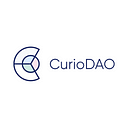Tokenization: Opening Illiquid Assets to Investors & CurioDAO: the Most Powerful Infrastructure in the Market to Unlock Capital from Real Assets Through Crypto
Introduction
In the past, investing in real estate or art was reserved for those with enough money to afford it. Today, however, new technology is making it possible for anyone to invest in these assets.
At CurioDAO we are decentralizing ownership, financing, and governance processes within investing in real assets. To achieve this, we’re pioneering approaches to fractional and decentralized ownership and IP.
For those who are not familiar with us, CurioDAO multichain protocol brings the most powerful infrastructure in the market for tokenized real assets while providing a fractional NFT marketplace, gasless AMM and real-asset-backed stablecoin within one single experience. The DApp provides multi-chain support on L1s and L2s, and features in-app fiat on-ramp, staking, liquid staking, and yield farming in-app which abstracts away complexity and allows users to earn yield from their real assets as easily as uploading a file. Even on non-EVM compatible blockchains.
Definition of tokenization
Tokenization can refer to two processes.
The first is “asset-backed tokens”, which are created when an investor purchases a token in exchange for a share of ownership in an asset. These types of tokens are backed by assets like real estate or gold and can be used as collateral for loans or traded on the market like any other cryptocurrency.
Rollapp.store (by Curio Capital): enables the creation of physical NFTs as well as the direct investment into asset originators’ real assets. Asset originators consign their real assets digitally, decreasing costs and, addressing key liquidity gaps.
The second process is securitization, which is where an institution issues digital tokens representing debt obligations that it has issued to investors — these are sometimes referred to as “debt-based tokens” or “credit-backed tokens”. You find those at CurioInvest.com (by Curio AG) which enable the creation of membership tokens.
The benefits of tokenization
The benefits of tokenization are numerous. It makes it possible to invest in assets that were previously inaccessible or illiquid, such as real estate, fine art, and private equity. Because the tokens represent fractional ownership in an asset rather than actual ownership, much higher levels of control and access can be granted to investors without compromising the underlying asset.
Tokenization is bringing liquidity to the $256 trillion market for illiquid assets, making investment access possible for millions of people around the world.
Tokenization is the process of converting rights to an asset into a digital token. Tokenization makes it possible to trade assets that are not liquid, allowing millions of people around the world to invest in assets they otherwise wouldn’t be able to access.
This is because many assets — such as real estate, fine art, and collectibles — have historically been out of reach for most investors due to their complexity and high barriers-to-entry. They represent more than $256 trillion in total value globally yet remain largely inaccessible due to their illiquid nature: once you purchase an investment in this type of asset, there may not be an easy way for you to sell it again without incurring high transaction costs or requiring an intermediary who can help facilitate the sale on your behalf.
Paving the way for a more inclusive future
Tokenization is the process of converting rights to an asset into a digital token on a blockchain. There are many potential uses for digital tokens, such as representing ownership shares in a company, ownership rights over physical assets or commodities like gold or oil, and even rights to profits from intellectual property. In this way, tokenization enables people who have previously been left out of the investment game — such as those living in developing countries with limited access to capital markets — to participate as investors on a global scale.
The first use case for tokenization was securities (stocks). The ability to trade shares digitally has made it possible for retail investors worldwide to access stock markets, leading us into what some analysts call “the era of democratized finance.”
Conclusion
All in, Rollapp (by Curio Capital) together with CurioDAO bring a web3 ecosystem for unlocking capital from real assets and IP. Our platform and scalable framework for real asset DAOs connect asset originators and real asset investors with quick and easy funding while enabling investors, storage, insurance, authenticators, auditors, and appraisers communities to directly govern and own asset back digital assets.
Tokenization is a powerful tool that is opening up the world’s largest market for illiquid assets by allowing people to invest in real estate, art and collectibles from their phones. And as more investors get involved, it will become easier for them to make these investments.
